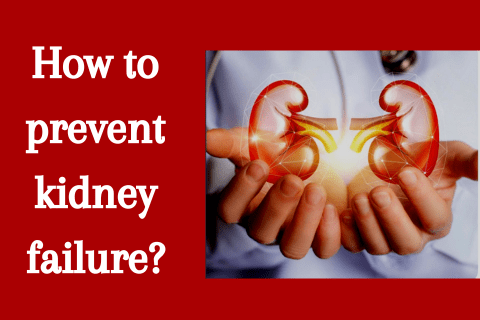

Preventing kidney failure is of paramount importance for overall health. This detailed article provides key recommendations to protect your kidneys. Learn the importance of keeping a balanced diet, staying hydrated, and managing chronic diseases like diabetes and hypertension. Examine the value of regular exercise, the risks of consuming too much salt and sugar, and the advantages of quitting smoking. Learn to spot early warning signals and comprehend the vital role that kidneys perform in removing waste and preserving electrolyte balance. By taking these preventative steps, you may greatly lower your risk of kidney disease and guarantee that your kidneys stay strong and effective for many years to come. To avoid the burden of kidney failure in the future, take care of your kidney health right now.
Causes of Kidney Failure
Kidney diseases mainly occur because of diabetes, high blood pressure, heart diseases, and a family history of having kidney problems. The other reason can be an unhealthy diet as well. Too much sugar or salt in food, consuming heavy amounts of alcohol can also damage the kidneys.
If someone has a kidney problem, then it’s time to take measures to reduce it. Because having constant kidney problems can lead to kidney failure. But it’s not impossible to reduce or prevent kidney failure. There are many different precautionary measures that can help you reduce kidney failure.
So, let’s start with the preventive measures for kidney failure. In this post, I have gathered detailed information on preventive measures to reduce kidney failure.
Prevention And Risk Management For Kidneys
Prevention of kidney failure is possible by managing risk factors and treating kidney disease to slow the progression of the disease.
Test for Chronic Kidney Disease
- If you are at risk, then you must test yourself for kidney disease on a regular basis.
- If you have diabetes problems, then you must test for kidney disease every year.
- It’s better to find and treat it early.
Tip for healthy kidneys
Here are some amazing tips that can keep your kidneys healthy.
- Try to lose weight if you are obese.
- Eat low salt food.
- Stop smoking.
- Do regular exercise to stay active.
- Manage your cholesterol range.
- If you have diabetes problems, stay in your sugar range.
- If you are on medication, Take it regularly.
Management of Risk factor of Kidney Disease
- Controlling blood sugar and blood pressure has been demonstrated to reduce the risk of developing kidney disease in patients with diabetes and high blood pressure.
- Studies have suggested that treating diabetic individuals with blood pressure-lowering medications may help to stop or delay the onset of diabetic kidney damage. These drugs not only lower blood pressure but also lessen urine protein, which is a risk factor for kidney failure.
- As risk factors for heart disease and stroke, controlling blood sugar, blood pressure, and cholesterol levels is important.
- Early kidney disease detection and treatment is crucial for people with diabetes to help prevent or postpone renal disease because it raises the risk of also having heart disease and stroke.
Read Also: 10 Warning signs that you may have Kidney disease
How to Manage Kidney Diseases and Prevent Kidney Failure
If you are diagnosed with Kidney disease, You must take the following measures to manage it:
Increased Improvements To Lifestyle (Such As Eating Healthily)
- Establishing a kidney-healthy food plan with the help of a nutritionist
Pick fresh fruits, fresh or frozen vegetables, whole grains, low-fat or fat-free dairy products, and other heart- and body-healthy foods. Eat wholesome meals and limit your intake of salt and extra sweets. Aim for a daily salt intake of no more than 2,300 milligrams. Less than 10% of your daily calories should come from added sugars.
Maintain A Healthy Weight to Prevent Kidney Failure
Diabetes and high blood pressure, two illnesses linked to kidney failure, are made more likely by being overweight. Try to manage your weight through regular exercise and eating healthy food.
Exercise Regularly to reduce kidney failure
Regular exercise helps you stay in good health since it lowers stress and prevents obesity. Diabetes and hypertension, the two main causes of renal failure, are greatly increased by obesity. Every day, you should engage in physical activity for at least 30 minutes. Exercise can take many different forms, such as walking, running, playing sports, or lifting weights.
Get Sufficient Sleep
Sleep for 7 to 8 hours every night. Improve your sleeping patterns if you have difficulty falling asleep. NIH external link.
Quit Smoking to reduce kidney failure
Stop smoking and using other tobacco products. So, you won’t have to do it alone, ask for assistance. Smoke free offers advice on how to stop smoking.
Reduce Alcohol Consumption
Alcohol use that is excessive can raise blood pressure and add extra calories to the body, which can result in weight gain. If you consume booze Limit your alcohol consumption to two drinks per day for men and one drink per day for women. One beverage is:
- a 12-ounce beer
- wine, 5 ounces
- 1.5 ounces of alcohol
Avoid Consuming Painkillers
Kidney disease can be brought on by taking NSAIDs (non-steroidal anti-inflammatory drugs) for pain too frequently. When NSAIDs are used for an extended period, especially at high doses, the blood supply to the kidney is decreased, harming the renal tissue. Inquire with your doctor about different painkillers, such as paracetamol.
Drink enough water
According to research, drinking plain water in particular can be helpful to protect renal function.
The National Kidney Foundation advises patients with chronic kidney disease (CKD) stages I and II to drink 8 glasses of water per day, whereas those with stages III, IV, and V should decrease their water intake. It is recommended that you talk to your doctor about your salt and water intake.
Conclusion
In conclusion, maintaining your kidneys’ health and wellbeing is essential for your overall health and wellbeing. You can greatly lower your risk of kidney disease by adopting simple but effective lifestyle behaviors like drinking plenty of water, eating a balanced diet, and exercising regularly. Always remember that prevention is the key and that spotting any warning signals quickly is essential. Give your kidneys the care and attention they deserve in return for all the hard work they do to keep you healthy. By following the recommendations provided in this article, you may take proactive measures to protect these important organs and live a healthy, kidney-friendly life.
FAQs
Are there any warning signs of kidney problems?
Yes, common signs include changes in urine color, increased urination at night, swelling in the ankles or face, fatigue, and high blood pressure. If you notice these, consult a doctor.
Is diabetes a risk factor for kidney disease?
Yes, diabetes is a significant risk factor. To prevent kidney disease, manage your blood sugar levels through a healthy diet and regular exercise if you have diabetes.
Can I protect my kidneys by drinking more water?
Yes, drinking enough water helps your kidneys function properly by flushing out waste and toxins. Aim for at least 8 cups (64 ounces) of water per day.
How can I prevent kidney disease?
You can prevent kidney disease by staying hydrated, eating a balanced diet, avoiding excessive salt and sugar, exercising regularly, and not smoking.
What are kidneys, and why are they important?
Kidneys are vital organs that filter waste and excess fluids from your blood, help control blood pressure, and maintain a healthy balance of electrolytes in your body.








